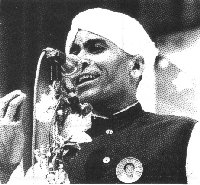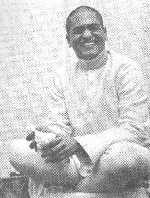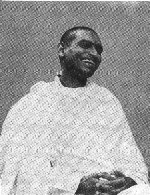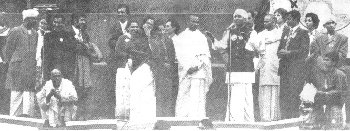|
|

|
Mahatma
Guru Charananand
|
DLM
Knowledge Sessions
in
the70's & early 80's
|
|

Krishnasukhanand
|

Gyan
Yoganand
|

Some
'Great Souls' of the 70s.
|
|
|
|
|
When
Maharaji began promoting his "Knowledge" (meditation
techniques) in the West, he was helped by dozens of East
Indian mahatmas. These mahatmas were Indian ashram
premies to whom Maharaji had given the "agya" (order) to
:
-
speak at public programs (read
some mahatmas'
satsang),
- administer the Western
ashrams,
- and to teach the Knowledge techniques to the people
who were ready to receive them.
The
mahatmas also decided who was ready to receive Knowledge
and who was not. The following is an attempt to give a
general feeling of what happened during these Knowledge
sessions during the 70's and 80's.
The mahatmas had specific instructions on how to present
the Knowledge to Westerners. They were told to present
the meditation techniques in such a way that Western
people could link them to Judeo-Christian religious
beliefs. The satsangs at that time would often refer to
the Bible, and refer to the belief that Jesus had taught
the Knowledge techniques to his disciples.
Bal
Bhagwan Ji's satsangs
of that time explains Knowledge in relationship to his
understanding of the Bible, and introduced the idea that
receiving Knowledge would reveal the hidden sense of the
Judeo-Christian scriptures to people.
The mahatmas would also often quote the Bhagavad Gita,
one of the most revered Indian holy scriptures, which
made people believe that Maharaji's Knowledge was based
on Hindu tradition as well, and that receiving Knowledge
would also reveal the secret meaning of Hindu scriptures.
Since many Westerners were then interested in Eastern
religious traditions, this was an added attraction.
The "Knowledge session", or initiation into the
meditation techniques, was usually held in an ashram, and
would begin by a satsang
from the mahatma. Then he or she would read quotes from
the Bible and the Bhagavad Gita. Then the people who were
going to receive Knowledge would have to take vows to
Guru Maharaj Ji:
-
Not to reveal the meditation techniques (when they are
well-known in the yogic
literature)
- To follow Maharaji's five commandments
- To practice satsang, service, and meditation
saying
the following wows:
'Oh
my Guru Maharaji, I dedicate myself to your lotus
feet. I am weak and ignorant and am filled with the
impurities of this world.
Oh Guru Maharaji, please take my mind and purge me
of the impurities I possess. Reveal to me the
knowledge of all knowledge.
Strengthen me, uplift me and reveal the kingdom of
heaven within inside of me.
Bring me from hate to love, from darkness to light,
death to immortality.
I will OBEY you implicitly and will never reveal
this knowledge to anyone for any reason.
I will keep in contact with you through my
DEVOTIONAL LOVE, satsang,meditation and
service.
Thank you my LORD for everything.'
Then
the four techniques were demonstrated, and practiced, one
after the other. Before demonstrating each technique, the
mahatma would give an explanation of the technique, and
illustrate it with quotes from the Bible and the
Bhaghavad Gita.
The four Knowledge meditation techniques as they were
taught in the 70's and 80's are illustrated below, along
with the most commonly used quotes from the Bible and the
Gita (read the comments
on
those quotes).
The
old DLM's Knowledge Session
"Know
ye not that ye are the temple of God,
and that the spirit of God dwelleth in
you?"
(Corinthians 3:16.)
"This Knowledge is a sovereign science, a sovereign
secret, supremely holy, most excellent, directly
enjoyable, attended with virtue, very easy to practise
and imperishable".
(Bhagwad Gita Chapter 9, slokas
1-2)
The
'Divine Light'
The
Inner Music
The
Word
The
Nectar
Note: The way the techniques are shown today, differs
slightly from the description on this page.
Click
here
to access the Ex-premie.org website and read the
description of the techniques as they're shown
today.
|
|
|
|
The
'Divine Light'
"'....
And there shall be no light there, and they need
no candle there, neither light of the sun, for
the Lord God giveth them light.'
(Revelations
22:5.)
The Divine Light (which Jesus spoke of in the
New Testament) cannot be visualised with our
outer, gross eyes. It may only be seen with the
third eye, the divine eye, which is opened by
the grace of the Perfect Master. In the Gita
(Chapter 11, sloka 8) Lord Krishna says:
'You
cannot see Me with these gross eyes.
I therefore bestow upon you the divine
eyes.' The
realised souls, when approached, open the divine
eye through which the real form of God can be
visualised." - From the Mahatma's
handbook.
Gently
press on your eyeballs and try to relax. After
some time, you should begin to see what Maharaji
says is the 'Divine Light' of God. Relax and go
with what you feel.
The 'classic' position for this meditation
technique is to place the forefinger in the
centre of the forehead (on the 'third eye'), and
gently press on each eyeball (one with the
thumb, the other with the middle finger) so that
your looking towards the centre of the
forehead.
The T-shaped arm support (known as a 'baragon')
is typically made out of a few pieces of wood
and a single coffee-table leg! As well as
supporting the arms, it helps keep a straight
back. It used to be an essential part of every
premie's's kit-bag.
|
|
|
'The
Word'
"'In
the beginning was the Word, and the Word was
God.' So
begins the first chapter of the Gospel according
to John. It is only a burning lamp that can
kindle other lamps. The Word can only be known
at the Feet of a living Spiritual Master, or
Satguru." - From the Mahatma's handbook.
Sit in a comfortable position (a couple of
cushions will help keep the back straight), keep
your eyes closed, and concentrate on the breath
as it comes in and goes out you. Focus on the
"So-Ham" sound produced by your breath. Relax
and go with what you feel.
|
|
|
The
Nectar
Push
the tongue back past the tonsils and lett it
slide up into the nasal passage. You might not
be able to push it that far, just push it as far
as you can against your palate, and let it then
rest.
Relax and go with what you feel.
|
|
|
|
![[Dividing Line Image]](div.gif)
Some
comments on the quotes used by Maharaji to validate his
'Knowledge'
The
following comments are from Michael Dresbach, who is an
Episcopal priest as well as being an ex-premie.
I have been bothered by the use of scripture by people to
defend terrible positions and have never liked the use of
scripture by Divine Light Mission in the Knowledge
session. The following is my passage by passage
refutation of the scriptures used by the Mahatamas. Some
passages are my own translation from the Greek, and
others are from New Revised Standard Version. The
passages used by the Mahatamas are from the King James
Version, which is not the translation to use if one is
trying to get a clear understanding of the text, since
Elizabethean English is pretty much the province of
scholars, actors, and folks at the Renaissance Fair.
Passage 1:
“Know
ye not that ye are the temple of God, that the spirit of
God dwelleth in
you?”
This comes from I Corinthians 3:16 (not Corinthians as
credited). What the heck does this have to do with
anything? Paul is dealing with disputes among the
Christians in Corinth, disputes which are threatening the
unity of the community. He applies the metaphor of the
temple to the community to show their unity. To destroy
the unity of the community with dissension and conflict
will destroy the temple of God. Others use this passage
as proof that we have God within us; I think that this
idea was a given for anyone sitting through a Knowledge
session. This passage is used by many groups for many
different reasons.
Passage 2:
“...and
there shall be no light there, and they need no candle
there, neither the light of the sun, for the Lord God
giveth them light.
(Rev. 22:5).” I would translate the entire verse as:
“and there will be no more night, and they
won’t need the light from a lamp or the sun because
God will be their light, and they will reign forever and
ever.” This passage is from the Apocalypse of St.
John or the Revelation of St. John, a book which is
supposed to be prophecy. The Context: the author was
presenting a vision of the New Jerusalem and the new
world that would come about with the eschaton. This had
nothing to do with ‘inner light’ and everything
to do with the presence of God. In chapter 21, verse 23
it states “and the city did not need the sun or the
moon for light, since it was lit by the radiant glory of
God, and the Lamb was a lighted torch for it.” I
think that one must stretch a bit for this to have
anything to do with inner light.
Passage 3:
“The
light of the body is the eye, therefore if thine eye be
single, thy whole body shall be full of
light”
(Matt. 6:22) I know that the premies always quoted
this verse, and I can see why: it is an obscure reference
at best, and doesn’t make any sense. It is an
example of mis-translation by the translators of James
the I. The ‘aplous’ [in the original
Greek] can be translated as “single,” but
also as “simple.” It can also be translated as
“clear, sound, or healthy” which actually makes
more sense than “single.” I translate this
passage as “the eye is the body’s lamp.
Therefore, if your eye is healthy (or clear) your whole
body will be filled with light.” Now, to be fair,
one must go on to the next verse, which says : “but
if your eye is diseased (or your eyes are bad), your
whole body will be in darkness. If the light is darkness,
how great is that darkness.” When I read this in
context with the other passages before and after it, it
seems to me that Jesus is talking about focus, and being
focused upon serving God and not material possessions.
But of course, I AM in my mind!
Passage 4:
“Blessed
are your eyes, for they can see; blessed are your ears,
for they can hear.”
(Matt. 13:16) Accurate translation, but totally out of
context. Jesus has just told the parable of the sower,
which talks about seed falling on fallow ground, bad
ground, and good fertile ground. It is a metaphor
regarding people’s oneness to the message of the
Reign of God ( a theological concept which deals with a
world in which God’s will is done, a world in which
there is justice and peace, no poverty or pain or weeping
or illness. It has nothing to do with ‘going
inside.’). Just before this quote, Jesus quotes the
prophet Isaiah “You will indeed listen, but never
understand, and you will indeed look, but never perceive.
For this people’s heart has grown dull, and their
ears are hard of hearing, and they have shut their eyes;
so that they might not look with their eyes, and listen
with their ears, and understand with their hearts and
turn-- and I would heal them.” THEN Jesus says:
“But blessed are YOUR eyes, for they see, and
blessed are YOUR ears, for they hear.” Those who are
listening and understand the message are then blessed; it
has nothing to do with seeing light and hearing inner
music.
Passage 5:
“Blessed
is the people that know the joyful sound: they shall walk
in the light of thy countenance. In my name shall they
rejoice all the
day.”
This was hard to find as they didn’t reference any
better than ‘Psalms’ (there are 150 Psalms!).
Using an analytical concordance, I found it in Psalm 89:
16, 17. The Blessed Mahatma ignored the final part of the
verse: and in thy righteousness shall they be
exalted.” There is also a misquote: it is
‘thy’ name, not ‘my’ name. A modern
and more accurate translation of these verses is
“Happy are the people who know the FESTAL SHOUT (my
emphasis)! they walk, O Lord, in the light of your
presence. They rejoice daily in your Name; they are
jubilant in your righteousness.” (NRSV) The Festal
Shout is a the phrase used in most modern translations as
opposed to "joyful sound." I find it difficult to connect
this to the ‘inner music’ when one translates
correctly. This section of the psalm (it has three
sections, actually) has to do with praise to the God of
Israel and His (In this context YHWH is a he, no getting
around it!) superiority over all the gods; I don’t
think it has anything to do with tinnitus!
Passage 6:
“And
I heard a voice from heaven, as the voice of many waters,
and as the voice of a great thunder. And I heard the
voice of harpers harping without their
harps”
(Rev. 14:2). Another passage from the Revelation, and
another one full of strange imagery. If one reads the
rest of the passage, one finds out that this sound is
coming from 144,000 men who are singing before the throne
of the Lamb. These men have “kept themselves chaste
and have not defiled themselves with women; these follow
the Lamb wherever he goes. They have been ransomed as the
first fruits of humanity for God and the Lamb. No lie was
found on their lips; they are without fault” (I
guess that eliminates them from the upper ranks of DLM!).
I have trouble seeing how this passage has anything to do
with the ‘inner music’ without a great stretch
or without taking it totally out of context.
Passage 7:
“In
the beginning was the Word, and the Word was with God,
and the Word was
God.”
(John 1:1) The Word is “logos” in Greek and
there are 2.75 pages of definition for this word in
Bauer’s Greek-English Lexicon. The concept of the
preexistent logos in Christian theology and Christology
is a complicated subject, but it is not sitting in the
lotus position breathing ‘so-hun!’
AND FINALLY Passage 8:
“Whosoever
drinketh of the water that I shall give him shall never
be thirsty, but the water that I shall give him shall be
in him as a well of water springing up into everlasting
life.”
This is a paraphrase of four verses, and of course it has
to do with drinking post nasal drip! The phrase
‘living water’ has a double meaning in Greek
which can’t really be explained in English. It means
‘running water’ and in this context, a
spiritual water which quenches a spiritual thirst.
John’s gospel is full of similar metaphors and even
more having to do with the “Bread of Life”, and
this story only appears in his gospel. Yeah, it’s
all about drinking snot.
I have said before, and I’ll say again, the reason
they quoted from the Hebrew and Christian scriptures was
to give Knowledge spiritual credibility in the West. Even
though most of us receiving Knowledge in those days had
left Judaism or Christianity, we still wanted to hear
that it was in the Bible. Just as Yogananda and
Ramakrishna and so many other Hindu groups added Jesus to
their pantheon of saints to add credibility to their
groups, Maharaji and his dad and the Mahatmas did this to
give them a spiritual legitimacy that they would not have
in the West without it.
In the spirit of taking passages out of context, I will
quote the Apostle Paul’s first letter to the
Christians in Corinth: “Knowledge
puffs up, but love builds
up.”
(I Cor. 8:1b).
|
|
![[Dividing Line Image]](div.gif)
|
![]()
![]()




![]()


![]()
![]()